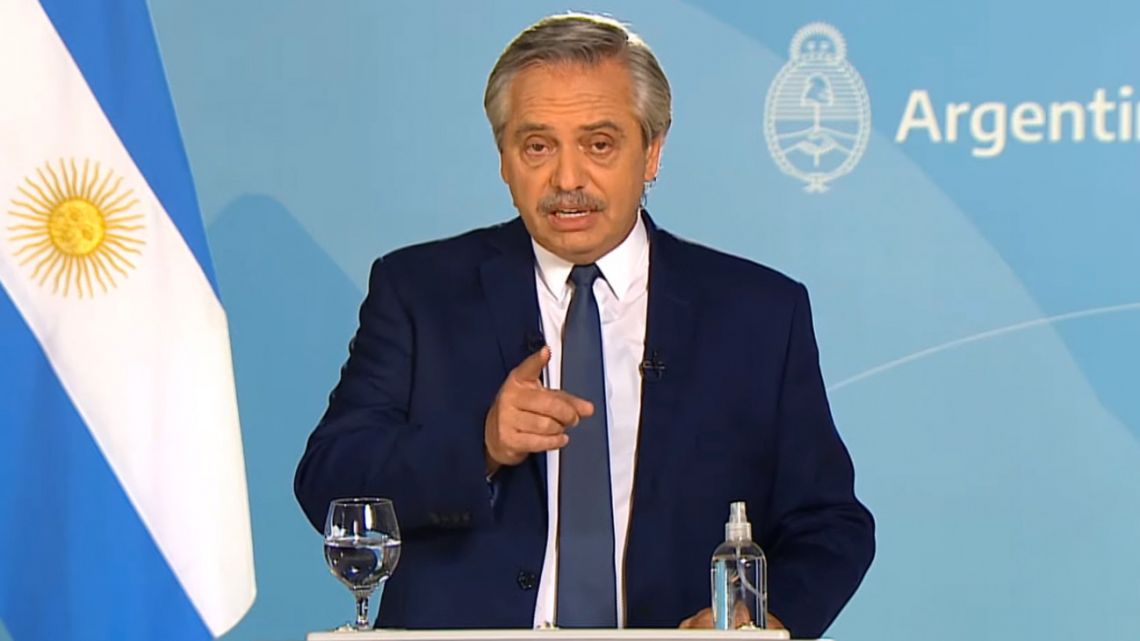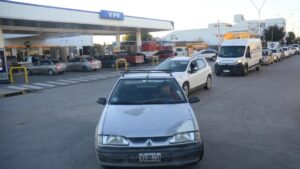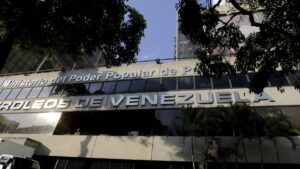
(Bloomberg, 4.May.2021) — In late March, Argentine President Alberto Fernandez sent his guy to Washington to smooth things over. With negotiations stalled, Economy Minister Martin Guzman had meetings with U.S. officials and the International Monetary Fund over its $45 billion loan.
Back home, Fernandez’s populist vice president took to the microphone to make one thing clear.
“We can’t pay because we don’t have the money,” said Cristina Fernandez de Kirchner, who held the nation’s top job from 2007 to 2015. The IMF’s terms are “unacceptable.”
It was a telling moment. When Fernandez, 62, took office in the final days of 2019, he presented himself as pragmatic. True, he’d briefly been Kirchner’s chief of staff within the Peronist left but he accepted a role for capitalism and wouldn’t allow Kirchner and her loyalists to set the agenda.
Few would argue that he has succeeded.
In recent days, Kirchner further asserted her influence by stopping the removal of an ally, a deputy energy minister in charge of key electricity prices.
“It’s evident that the president is backing the core Kirchner wing of his coalition,” says Jimena Blanco, director of Latin America research at consulting firm Verisk Maplecroft in Buenos Aires. “That’s going to create more tension and uncertainty.”
Indeed, six months before midterm elections, pragmatism is a distant memory. A strategy that puts political decisions above everything has squashed any plan to boost exports, lower inflation and kick-start growth. Exacerbated by the pandemic and too few vaccines, a rudderless economy is having its revenge.
Social unrest, closed schools, packed hospitals, cabinet disputes and a deteriorating business climate loom. Nearly 70% of ICU beds are occupied. About 42% of Argentines live in poverty, up from 26% in 2017.
Economic plight is so common, it’s playground talk. Kids in Buenos Aires know the dollar exchange rate, the level of inflation and what a sovereign default means.
That’s because Argentina has defaulted nine times and mostly been run by those hostile to the Washington consensus. That changed briefly in 2015 when Mauricio Macri won. He tried to open the economy but recession unraveled his presidency, bringing back the populists. People expected Fernandez to strike a happy medium. They don’t anymore.
It’s been illegal for companies to fire workers for over a year. Businesses face price freezes. Savers can only exchange pesos for $200 a month. If Argentines use their credit card abroad, they pay a 30% “solidarity tax.” The rich are fighting against a new levy on wealth. Inflation will reach 50% again this year, while consumer confidence is tanking.
Pandemic fatigue and finite resources are aggravating poor internal coordination.
To be sure, Fernandez inherited Herculean challenges. In 2018, Macri agreed to an IMF deal with unrealistic assumptions and failed to stabilize the economy. He also passed on high inflation, as Kirchner had done to him.
Fernandez, who spent years lambasting Kirchner’s leadership and then set aside their differences, won the presidency having never run for governor, mayor or congress.
An official close to him says he hopes to get wages to beat inflation but concedes that some of his policies, such as price controls, aren’t ideal.
Juntos por el Cambio is his biggest opponent in the vote, which chooses half the seats in the lower house and a third in the senate. Buenos Aires Mayor Horacio Rodriguez Larreta, the top opposition leader, pushed to reopen schools and saw his popularity soar.
Fernandez may benefit from surging commodity prices and some stimulus at the IMF. But after restructuring $65 billion with private creditors last year, IMF talks have bogged down and no plan has emerged.
As a vaccine scandal over shots for VIPs erupted, Fernandez’s approval dropped to 36.7% by late April from a peak of 57% almost a year ago, according to Buenos Aires-based pollster Management & Fit.
Much of the drop is over the economy. Argentines just endured a three-year recession, where the peso lost 80% of its value and people pulled half of their dollar deposits, leading to capital controls.
The economy contracted in February, and a low-quality recovery seems underway: Argentina gained 1.3 million informal jobs in the second half of last year but shed 189,000 formal jobs.
Companies, especially multinationals, are increasingly at odds with the government as it talks about another basket of 100 essential goods that would have prices frozen for half the year, according to people with direct knowledge.
“Uncertainty turns into distress, distress into frustration, and frustration into little desire to invest,” says Alejandro Diaz, CEO of AmCham Argentina, the lobby for U.S. companies in the country. When companies’ costs rise more than double the price of their products, “the temporary policy becomes structural.”
Amid the new Covid wave, Argentina has debt payments coming due with limited foreign reserves. It owes $2.4 billion to the group of rich countries known as the Paris Club, due this month. By September, it needs to start repaying the IMF.
No IMF deal gets a green light without U.S. support. For now, Argentina caught a break from Joe Biden’s administration. A U.S. effort to boost the IMF’s reserves, known as SDRs, may offer breathing room — some extra cash in its stake at the IMF that it could use to cover two principal payments later this year.
“The IMF deal may not only narrow differences between the opposition and ruling party, but also the differences within the coalition itself,” says Emmanuel Alvarez Agis, a former economy vice minister under Kirchner. “Investors see that Argentina took out an IMF debt that isn’t compatible with the size of the economy. The issue is, how do you get out of this problem?”
____________________

